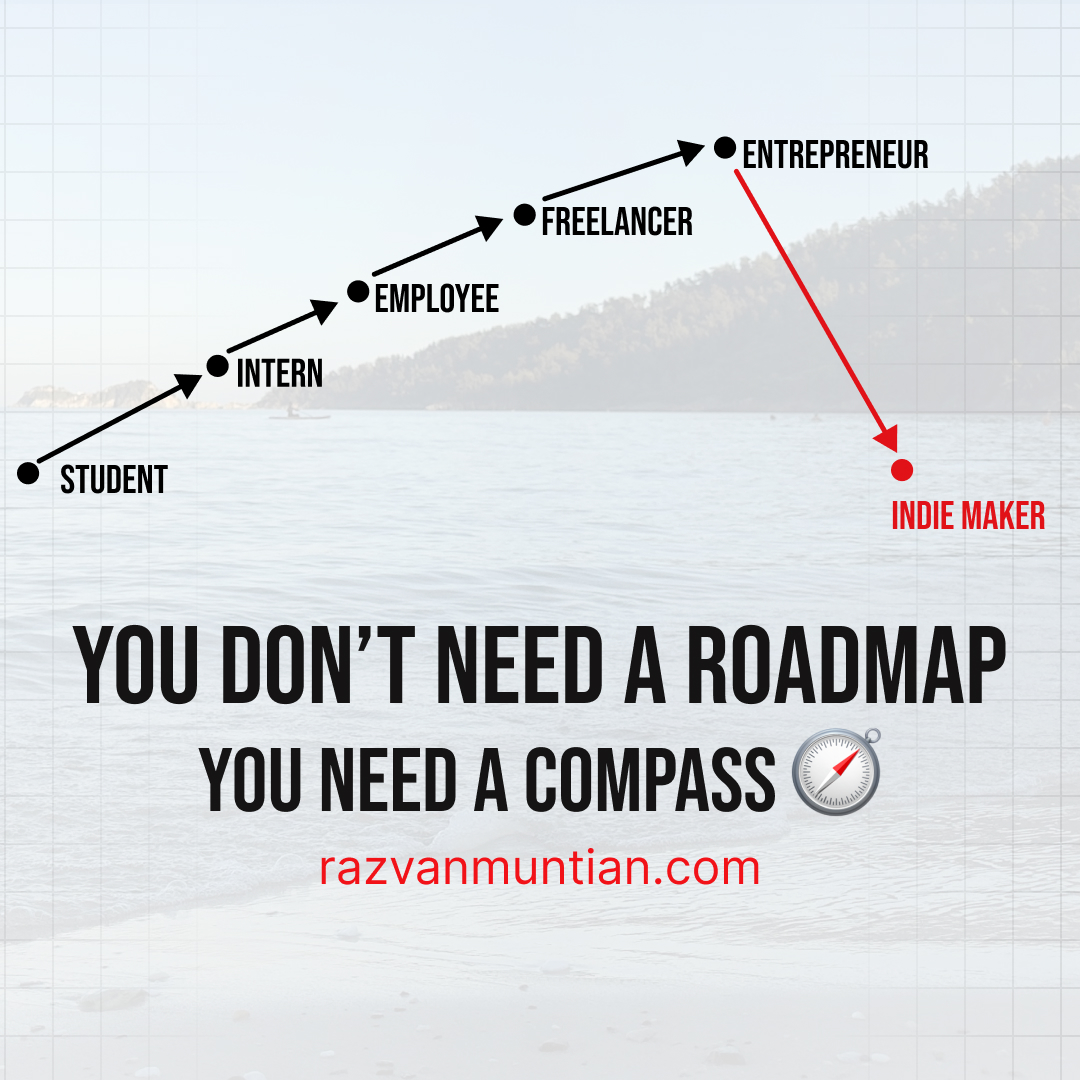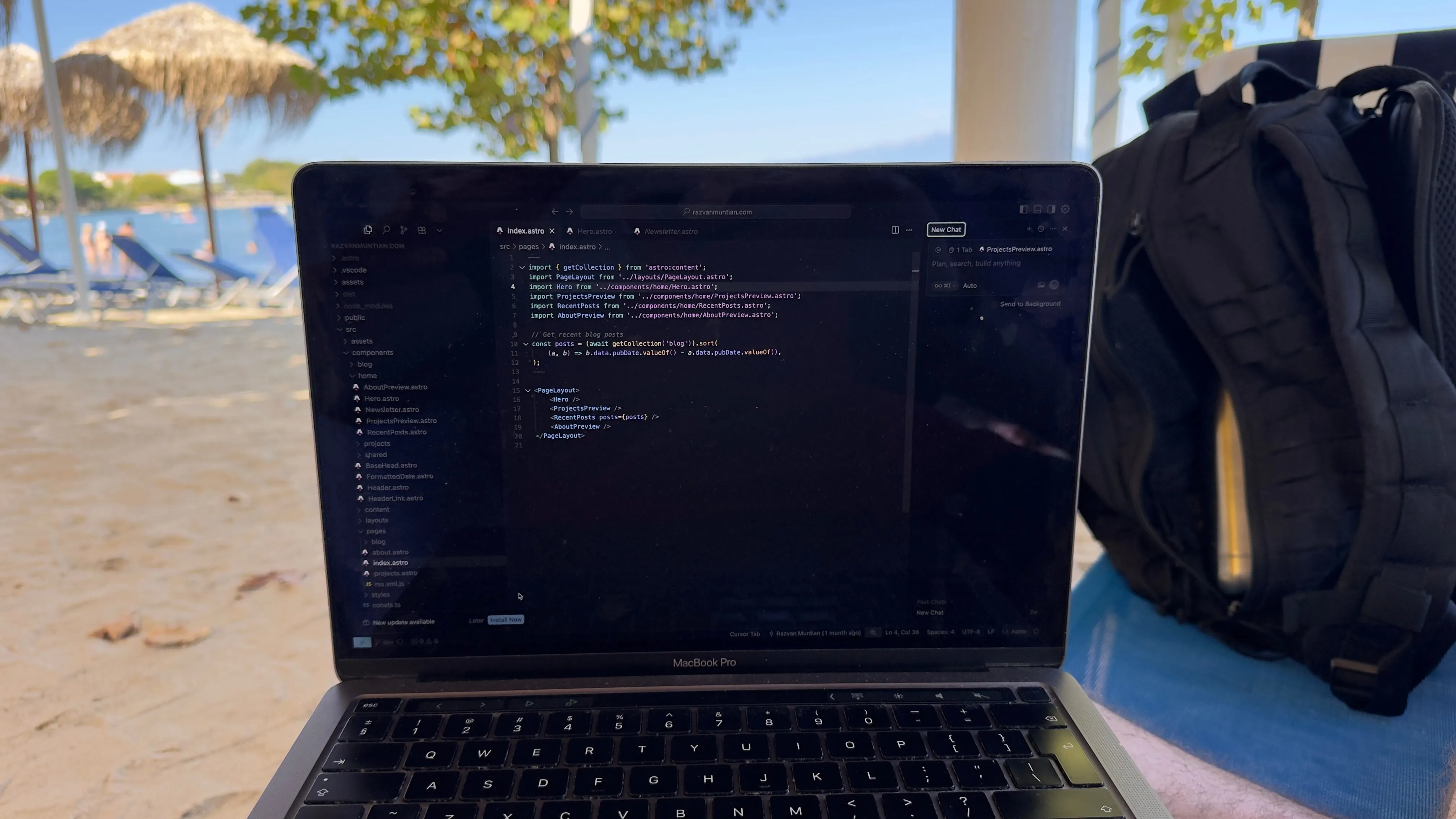
You don't need a roadmap. You need a compass.
Hello friend,
Maybe you’ve heard this type of story: “I was working a difficult physical job. Then I started copying and pasting some code after watching a Youtube tutorial. All of a sudden, I put together an app and tried to sell it. It worked, and I went from my difficult job to working on my own startup”.
There are many successful stories out there. They are inspirational. Some people spend years before becoming successful.
Compared to them, my journey is not that interesting. I wasn’t living on a friend’s couch, trying to ship my first startup. And maybe I won’t make as much money or be as successful as others who go through this struggle.
In this post, I want to share my professional story, what I went through until I became an indie maker.
Nobody enjoys seeing someone brag. This post isn’t for that. I want to share some lessons I’ve learned across these 10 years, and I’ll try to underline some takeaways for you.
You don’t need a roadmap. You need a compass.
I don’t remember where I got the quote from, but this describes my journey best: “You don’t need a roadmap. You need a compass”.
Figuring out the way is part of the process. What worked best for me is having a general direction where I want to go. At this very moment, I know I want to make a living building my own apps. I don’t have all the details yet, and I don’t even have a proper plan. But I figure it out along the way.
Indie making is what I discovered recently. Initially, I wanted to do something else. Let me explain:
The university
My purpose while going to the university was to learn coding and land a job as a software engineer. That was my goal, and the uni helped me move forward.
But the university isn’t for learning how to write code. Truth be told, the things I learned as a student aren’t sufficient for a software development role. We wrote C, C++, Java, SQL and some antique programming languages.
The professors teaching C and C++ said their programming language is the best one you can learn. Java professors claimed that OOP is the best, and web programming is crap. (Probably that’s why the uni website and all the portals were absolute garbage). This was the atmosphere, you get the point.
Uni is for networking. If you’re aiming to land a job in IT, think of university as an opportunity to connect with different colleagues who might recommend you later when you change jobs. It’s also an opportunity to land internships at multiple companies.
If you’re a good student, it’s a sign that you’re dedicated and eager to learn, and companies and recruiters appreciate that. They know you know almost nothing.
My internship in tech
After preparing a resume (which really didn’t contain much, since I didn’t have past experience, and the only projects I’d worked on were airport simulators and book libraries) and taking some interviews, I finally got accepted for an internship.
Guess what: my purpose changed. From focusing on passing exams, now I had a different goal: do a great job, impress the company and hopefully land a job in tech.
In my case, the internship was incredible: I learned as much as I could and was willing to put in the effort and work hard.
My dream job lasted for one year
After two months of internship, hard work and an interview, I got my first real job. I had always dreamed of being a programmer. And I achieved it.
Long story short, I spent 1 year working at that company, until, all of a sudden my purpose changed once again.
This job helped me acquire the fundamentals and work ethic. Besides the regular projects, I participated at a hackathons with my team. It was an amazing, dynamic and passionate small team, and this experience helped me so much. I’ll forever be grateful for them.
But after one year, an idea popped into my mind: I wanted to try freelancing. And that’s what I did.
I was freelancing for a while
Some people told me that I should work in parallel, to have a safety net and so on. I did the exact opposite. And it was difficult at that time. It took me about 4-5 months to find a project.
Why did I choose not to listen to them?
I learned that being focused on one thing only is much more productive.
This might not work for others, but it definitely works for me. My purpose changed again. From trying to do my job as best as I could, my new purpose was tied to becoming a better programmer, but also learning how to negotiate and find projects.
By each new collaboration, I acquired new skills. It wasn’t easy, I’d say the exact opposite. The transition from job to freelancing took me months of unpaid work, until I figured out how things are done.
Freelancing was interesting, but the next period was much more than that.
From freelancing to outsourcing company
The transition from freelancing to owning a software outsourcing company started in the most unexpected way: I got married. 🤵👰
Until that time, my wife worked at multiple big companies in Cluj-Napoca, while I was doing freelancing. Everything went well. But we decided to do something that might have looked insane from the outside: I ended up the long term collaboration with my client, and she resigned from her job. Crazy? Hold on: 3 months before our wedding.
And we didn’t do anything 4 months after the wedding. I could say we had 7 months honeymoon. Of course, she was the mature one, saying that we should get a job, but I was like “we have the wedding money, we’re fine” 😂
“But what has this to do with the outsourcing” you might ask. Yes, let’s get back to that.
We started our own company and we have been working together since then. This newsletter would get too long to go into too much detail, but slowly we hired other people and it was an amazing journey.
My purpose changed again: from being a lonely wolf, to leading a pack of wolfs. This period was the most insightful, and I think I acquired some useful skills, that I could not have learned in another way.
Besides skills, this period helped me prepare what was to come. We all know that the tech industry changed drastically in the last year. Unfortunately, our collaborations with our clients ended, and I thought it was the best time to pivot to something even more challenging: indie making.
The indie making journey
This is what I do right now. Instead of leading a team, I thought I could switch gears and try building my own products.
As a dev freelancer or outsourcing company you get involved in other people’s projects. You are simply transforming their requirements and ideas into products.
But I wanted to work on my own projects. I knew it would be difficult, but if I manage to make it work, it’ll be so worth the effort.
There’s so much to say about indie making, but there’s also so much I still need to learn. My focus had to change: from managing a team and doing client work to building my products. I tried doing both in parallel, but I ended up with poor results to both.
Now, my purpose is to build my own apps, try to make a living out of that, share everything online, be as creative as I can and really enjoy the whole process. So far, the last 10 months have been the best period of my life. I feel so refreshed being able to dedicate this time to my own projects, learning, building and networking.
Some recommendations
I didn’t want to close this newsletter without coming up with some practical advice. These are just my thoughts, but I hope they inspire you:
- Always learn - I know it sounds cliche, but you may have to change your job and career path multiple times. Be prepared for this and keep your mind active and curious.
- Networking - Take networking in the broadest sense: connecting with people, talking, social media, everything related to relationships. Networking is the one thing that helped my career get better and better. Don’t neglect that. It’s so difficult to do, but so worth it.
- Focus - Focusing on multiple things at once didn’t work for me. Not sure if you have the opportunity to work on your own projects only, but try to plan in advance and find some time to concentrate on one skill only at a time.
- Don’t be afraid to jump - Parents tend to be protective with their kids. They might value having a thick safety net. If you’re young, or just starting out, don’t be afraid to jump. So turn on speakers as loud as possible, go on Youtube and listen to what Eddie Van Halen says: “Jump” 🤘

In conclusion
I’ll end this newsletter with a personal update. I’m writing this while being in Greece. Traveling is so fun, and I’m very productive if I change the environment. But these days I was so tired, since we traveled by car.
I wasn’t driving, but I was the GPS operator and the translator as well. We are here in Greece with family, so we try to spend some time together too.
Usually, one vacation per year spent with family, which I think is a great thing, to reunite and share stories.
I encourage you to follow me on social media to follow with my journey. I’ll try to be as active as possible, but will also take some days to rest.
These are a few places where you can find me:
👉 I’m most active on X/Twitter: https://x.com/razvanmuntian
👉 Checkout my LinkedIn account as well: www.linkedin.com/in/razvanmuntian
👉 Or if you prefer Instagram: https://www.instagram.com/razvanmuntian
👉 My personal website: https://razvanmuntian.com
Thank you so for reading this post and I hope it’s been inspirational!
See you soon!